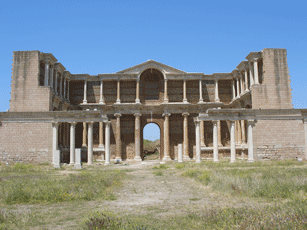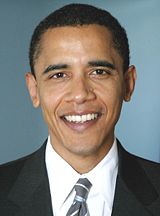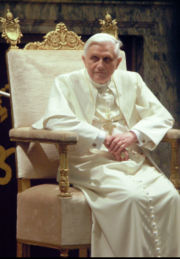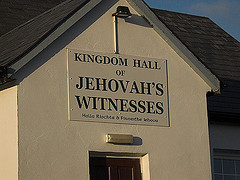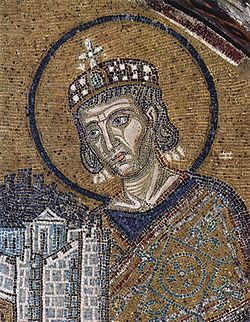
Mosaic of Emperor Constantine in the Hagai Sophia in Istanbul
COGwriter
Most who have studied early Christianity realize that early Christians refused to participate in carnal warfare. And while true Christians still maintain the position held by the New Testament Church, many who profess Christ accept that they can participate in carnal warfare.
But most who call themselves “Christian” also do not realize that they accepted carnal warfare because of the actions and beliefs of the sun-worshiping Emperor Constantine.
The Church of Rome originally did not accept military participation by its members, nor did those truly in the early Church of God.
Rome really adopted the acceptance of military service once it had a benefactor known as Emperor Constantine. Notice the accounts from two historians:
The Battle of the Milvian Bridge (312 A.d.)…Constantine…the… cross. He had been led to adopt this emblem through the appearance, as once he prayed to the sun-god, of a cross over the setting sun, with the inscriptson upon it, In this sign conquer. Obedient unto the celestial vision, Constantine had at once made the cross his banner,a and it was beneath this new emblem that his soldiers marched to victory at the battle of the Milvian Bridge.
Whatever may have been the circumstances or the motives which led Constantine to make the cross his standard, this act of his constitutes a turning point in the history of the Christian Church. Christianity had come into the world as a religion of peace and good will. The Master had commanded his disciples to put up the sword. For two centuries and more, obedience to this command by a large body of his followers had been so implicit that a Quaker, nonmilitary spirit had throughout this period characterized the new sect . Some of the early Church Fathers taught that the profession of arms was incompatible with a true Christian life. But after the victory for the Cross at the Milvian Bridge a change passed over the Church. It leaned more and more upon earthly power, and became militant. This infusion into the Church of the military spirit of Rome was one of the most important consequences of the story of the miraculous cross in the sky, and of the espousal of the Christian cause by the emperor Constantine. (Van Ness Myers, Philip. Ancient History. Published by Ginn and company, 1916 Original from the New York Public Library Digitized Sep 26, 2007pp. 480-481).
{Constantine} described to them the figure of the sign he had seen, bidding them represent it in gold and precious stones…Now it was made in the following manner. A long spear, overlaid with gold, formed the figure of the cross by means of a transverse bar laid over it. On the top of the whole was fixed a wreath of gold and precious stones; and within this, the symbol of the Saviour’s name, two letters indicating the name of Christ by means of its initial characters, the letter P being intersected by X in its centre…The emperor constantly made use of this sign of salvation as a safeguard against every adverse and hostile power, and commanded that others similar to it should be carried at the head of all his armies (Eusebius. The Life of Constantine, Chapter 31).
So, in other words, like the Quakers and the Living Church of God, those who considered themselves Christians were opposed to military participation until a sun-worshiping emperor claimed to see a spear in the sky with a cross bar. Then he and his immediately “Christian” soldiers used this as their emblem when they went and killed. So, this is how participation in carnal military warfare became “acceptable”. Do Protestants, Catholics, and Orthodox realize that this is the real reason that “Christians” decided that they could bear arms for carnal governments?
Falsely called “Christians” accepted participation in carnal warfare because of Emperor Constantine. And though they may come up with many other reasons to justify it, historically it was Constantine that got many who professed Christ to decide that Christian warfare could be carnal in this age.
In the fourth century, Emperor Constantine also declared in favor of the religion of the Roman Catholics. Around 332, Constantine issued what is known as the Edict Against the Heretics,
Victor Constantinus, Maximus Augustus, to the heretics. “Understand now, by this present statute, ye Novatians, Valentinians, Marcionites, Paulians, ye who are called Cataphrygians,3304 and all ye who devise and support heresies by means of your private assemblies, with what a tissue of falsehood and vanity, with what destructive and venomous errors, your doctrines are inseparably interwoven; so that through you the healthy soul is stricken with disease, and the living becomes the prey of everlasting death. Ye haters and enemies of truth and life, in league with destruction! All your counsels are opposed to the truth, but familiar with deeds of baseness; full of absurdities and fictions: and by these ye frame falsehoods, oppress the innocent, and withhold the light from them that believe. Ever trespassing under the mask of godliness, ye fill all things with defilement: ye pierce the pure and guileless conscience with deadly wounds, while ye withdraw, one may almost say, the very light of day from the eyes of men. But why should I particularize, when to speak of your criminality as it deserves demands more time and leisure than I can give? For so long and unmeasured is the catalogue of your offenses, so hateful and altogether atrocious are they, that a single day would not suffice to recount them all. And, indeed, it is well to turn one’s ears and eyes from such a subject, lest by a description of each particular evil, the pure sincerity and freshness of one’s own faith be impaired. Why then do I still bear with such abounding evil; especially since this protracted clemency is the cause that some who were sound are become tainted with this pestilent disease? Why not at once strike, as it were, at the root of so great a mischief by a public manifestation of displeasure? (Chapter LXIV.—Constantine’s Edict against the Heretics. This document is from the Christian Classics Ethereal Library at Calvin College).
Some of those referred to as Paulians (Paulicians) and Cataphrygians were part of the true Church of God (please see the article The Churches of Revelation 2 & 3). Note that they are condemned for private assemblies and being haters of truth. Apparently Constantine felt that supporting the biblical sabbath, the biblical Passover, and other biblical doctrines were against his non-Christian version of the truth.
It is astounding to note it has been reported that,
More Christians were killed (by other Christians!) in the first century after the Council of Nicea than had been killed by pagans in the century before Nicea. Constantine, only one year after convening the Council of Nicea, had his own son (Crispus) put to death. Later he suffocated Fausta (his wife) in an overheated bath. Then he had his sister’s son flogged to death and her husband strangled. (1) It was also during the reign of Constantine that the cross became a sacred symbol in Christianity, just as it had been in pagan religions.(2) Throughout his reign, Constantine treated the bishops as political aides. He agreed to enforce whatever opinion the majority of the bishops formulated (Chaimberlin RA. Anti-Judiasm and the Council of Nicea. From Petah Tikvah Magazine Vol. 14, No. 3, http://www.yashanet.com/library/antisem.htm 4/28/04).
Of course, we in the Churches of God do not believe that true Christians were involved in intentionally killing Christians as true Christians are opposed to fighting in the military.
Leading Roman Catholic theologians tried to justify war in the fifth and thirteenth centuries, and Thomas Aquinas actually listed some of the objections that real Christians should have to war:
Objection 1. It would seem that it is always sinful to wage war. Because punishment is not inflicted except for sin. Now those who wage war are threatened by Our Lord with punishment, according to Mt. 26:52: “All that take the sword shall perish with the sword.” Therefore all wars are unlawful.
Objection 2. Further, whatever is contrary to a Divine precept is a sin. But war is contrary to a Divine precept, for it is written (Matthew 5:39): “But I say to you not to resist evil”; and (Romans 12:19): “Not revenging yourselves, my dearly beloved, but give place unto wrath.” Therefore war is always sinful.
Objection 3. Further, nothing, except sin, is contrary to an act of virtue.
But war is contrary to peace. Therefore war is always a sin.
Objection 4. Further, the exercise of a lawful thing is itself lawful, as is evident in scientific exercises. But warlike exercises which take place in tournaments are forbidden by the Church, since those who are slain in these trials are deprived of ecclesiastical burial. Therefore it seems that war is a sin in itself.
On the contrary, Augustine says in a sermon on the son of the centurion [Ep. ad Marcel. cxxxviii]: “If the Christian Religion forbade war altogether, those who sought salutary advice in the Gospel would rather have been counselled to cast aside their arms, and to give up soldiering altogether. On the contrary, they were told: ‘Do violence to no man . . . and be content with your pay’ [Luke 3:14. If he commanded them to be content with their pay, he did not forbid soldiering.” (Aquinas Thomas. The Summa Theologica of St. Thomas Aquinas. Second and Revised Edition, 1920. Literally translated by Fathers of the English Dominican Province. Online Edition Copyright © 2006 by Kevin Knight. Nihil Obstat. F. Innocentius Apap, O.P., S.T.M., Censor. Theol. Imprimatur. Edus. Canonicus Surmont, Vicarius Generalis. Westmonasterii. APPROBATIO ORDINIS. Nihil Obstat. F. Raphael Moss, O.P., S.T.L. and F. Leo Moore, O.P., S.T.L. Imprimatur. F. Beda Jarrett, O.P., S.T.L., A.M., Prior Provincialis Angliæ).
After listing 4 valid objections, Aquinas attempts to justify war over those objections. I would simply comment here that it is impossible to Do violence to no man if you are killing or trying to kill others–thus for Aquinas to use Augustine’s argument here simply does not prove his point. The main point of Luke 3:14 is that John the Baptist taught that newly repentant people who happened to have been in the military (and who probably were not allowed to quit) should do NO VIOLENCE. Presumably, like the Apostle Paul taught about slaves (1 Corinthians 7:21), soldiers were being told that they should accept their burden until they could be free of it–and perhaps because of them doing no violence, it may be that they might be allowed out of their military obligation early (military commanders generally do not want soldiers who will not fight).
Anyway, to further justify war, Thomas Aquinas continued with:
Those who wage war justly aim at peace, and so they are not opposed to peace, except to the evil peace, which Our Lord “came not to send upon earth” (Matthew 10:34). Hence Augustine says (Ep. ad Bonif. clxxxix): “We do not seek peace in order to be at war, but we go to war that we may have peace. Be peaceful, therefore, in warring, so that you may vanquish those whom you war against, and bring them to the prosperity of peace” (Ibid).
Perhaps I should add here that the term “evil peace” is in no version of the Bible that I have ever seen, hence does not appear to be a valid reason for justifying Christian participation in warfare.
Warfare, sadly, was not one of the doctrines that Protestants protested and they seem to have accepted the Roman positions on warfare.
It should be noted that although the early Church was against military service, in the fourteenth century the Roman Church later decreed:
Both, therefore, are in the power of the Church, that is to say, the spiritual and the material sword, but the former is to be administered for the Church but the latter by the Church; the former in the hands of the priest; the latter by the hands of kings and soldiers, but at the will and sufferance of the priest. However, one sword ought to be subordinated to the other and temporal authority, subjected to spiritual power…Furthermore, we declare, we proclaim, we define that it is absolutely necessary for salvation that every human creature be subject to the Roman Pontiff (THE BULL UNAM SANCTAM , 1302. English translation taken from a doctoral dissertation written in the Dept. of Philosophy at the Catholic University of America, and published by CUA Press in 1927. In Medieval Sourcebook, http://www.fordham.edu/halsall/source/b8-unam.html 01/16/06).
Thus, Roman leaders endorsed killing and the use of the military under the authority of church leadership.
The Crusades were one of the most famous use of the military by those associated with the Roman Catholic (as well as Eastern Orthodox) Church.
As well as the famous inquisition:
The next major step in the establishment of the Inquisition was taken by Innocent III…In the West, the same pope launched a “Crusade” against the Cathars, or Albigenses, of Southern France in 1208…In the second century of the Christian Era, most Christians refused to take up arms at all.. One millennium later, Christians were not only fighting for the church against “infidels” who had conquered ancient biblical lands, but against other Christians, heretical ones, who only asked to be able to live in peace on their ancestral soil…Perhaps for medieval popes the crucial factor that caused them to condemn dissidents was really the dissidents’ rejection of papal authority (Brown HOJ. Heresies: Heresy and Orthodoxy in the History of the Church. Hendrickson Publishers, Peabody (MA), 1988, p. 260-261).
But using military force was not just Rome’s position in the Middle Ages.
Notice the following curious statements from the current its pontiff, Benedict XVI, who to a large degree is supporting his predecessor, as well as the position of Aquinas:
In this regard, the Introduction of “Spirituali Militum Curae” expressly cites “Gaudium et Spes,” recalling that those doing military service must be considered as “ministers of the security and freedom of peoples”, because, “if they carry out their duties properly, they also truly contribute to stabilizing peace” (cf. “Gaudium et Spes,” n. 79).
If, therefore, the Council calls members of the armed forces “custodians of security”, how much more so would be the Pastors to whom they are entrusted!
I therefore urge you all to ensure that military Chaplains are authentic experts and teachers of what the Church teaches and practices, with a view to building peace in the world.
Pope John Paul II’s Apostolic Constitution is an important milestone in this teaching and its contribution in this context can be summed up in the words you have rightly chosen as the theme of this Congress: “‘Ministerium pacis inter arma’ — Soldiers at the service of peace”.
My Predecessor considered this “ministerium pacis inter arma” “a new proclamation of the Gospel in the military world, of which the Christian soldiers and their communities cannot fail to be the first heralds” (Address, Third International Congress of Military Ordinariates, 11 March 1994; ORE, 23 March, n. 5, p. 6).
The Church is missionary by nature and her principal task is evangelization, which aims to proclaim and to witness to Christ and to promote his Gospel of peace and love in every environment and culture.
The Church is also called in the military world to be “salt”, “light” and “leaven”, to use the images to which Jesus himself refers, so that mindsets and structures may be ever more fully oriented to building peace, in other words, to that “order planned and willed by the love of God” (Message for World Day of Peace, 1 January 2006, n. 3; ORE, 21 December 2005, p. 6), in which people and peoples can develop to the full and see their own fundamental rights recognized (cf. ibid., n. 4).
The Church’s teaching on the subject of peace is an essential aspect of her social doctrine. Grafted onto very ancient roots, it continued to develop in the past century in a sort of “crescendo” which culminated in the Pastoral Constitution “Gaudium et Spes,” in the Encyclicals of Bl. John XXIII and of the Servants of God Paul VI and John Paul II, as well as in their Addresses to the United Nations Organization and their Messages for each World Day of Peace.
This insistent appeal for peace has influenced Western culture, fostering the ideal that the Armed Forces are “an exclusive service for the security and freedom of peoples” (John Paul II, Address, Third International Convention of Military Ordinariates; ORE, 23 March 1994, n. 5, p. 6). (Benedict XVI. Giving Priority to the Soldier’s Christian Formation. Vatican translation of the address Benedict XVI delivered in the Vatican on Oct. 26 to the participants in the 5th International Congress of Military Ordinariates. From http://www.zenit.org/english/ 11/13/06 ).
So even though mentioning the “Gospel of peace”, Benedict XVI seems to clearly be teaching that participants in the military are essential to the Roman Catholic’s teaching on peace. We in the Living Church of God take a very different view.
Notice, for example, what the Living Church of God has written about the “gospel of peace”:
Our job in the Kingdom of God will be to bring peace to this world, and to show mankind the way to peace. This is what the “gospel of peace” is about (Ephesians 6:15)…
David wrote, “Great peace have those who love Your law, and nothing causes them to stumble” (Psalm 119:165)…
Paul explains that the fruits of the Holy Spirit are “love, joy, peace, patience, kindness, goodness, faithfulness, longsuffering, self-control” (Galatians 5:22-23)…
Jesus Christ will soon return to the earth as the Prince of Peace, to establish the Kingdom of God. We have been called to reign with with Him. This is what Scripture calls the “gospel of peace” (Ephesians 6:15)…
Study the biblical priniciples which point to the way of peace, and strive to develop those skills…so that you can receive the reward Jesus Christ will bring when He returns to establish peace on earth! (Winnail D. Are You A Peacemaker? Do you understand the Gospel of Peace? Living Church News, Sep-Dec 2007).
Notice that the Bible prophecies about Jesus:
He shall judge between many peoples, And rebuke strong nations afar off; They shall beat their swords into plowshares, And their spears into pruning hooks; Nation shall not lift up sword against nation, Neither shall they learn war any more. But everyone shall sit under his vine and under his fig tree, And no one shall make them afraid; For the mouth of the LORD of hosts has spoken (Micah 4:3-4).
Thus, we in the Living Church of God see no reason to encourage behavior that Christ will eliminate. And that is part of why we in the Living Church of God teach against Christians participating in carnal warfare.
Furthermore, since New Testament and the facts of early church history show that carnal warfare was not considered acceptable by most who professed Christ (until the time of Constantine) we do not consider that carnal warfare is part of acceptable Christian behavior–it is not part of the gospel of peace.
Several articles of possibly related interest may include:
Military Service and the Churches of God: Do Real Christians Participate in Carnal Warfare? Here are current and historical perspectives on a matter which show the beliefs of the true church on military participation. Is war proper for Christians?
Hope of Salvation: How the Living Church of God differ from most Protestants How the Living Church of God differs from mainstream/traditional Protestants, is perhaps the question I am asked most by those without a Church of God background.
The Similarities and Dissimilarities between Martin Luther and Herbert W. Armstrong This article clearly shows some of the doctrinal differences between in the two. At this time of doctrinal variety and a tendency by many to accept certain aspects of Protestantism, the article should help clarify why the Living Church of God is NOT Protestant. Do you really know what the Protestant Reformer Martin Luther taught and should you follow his doctrinal example?
Which Is Faithful: The Roman Catholic Church or the Living Church of God? Do you know that both groups shared a lot of the earliest teachings? Do you know which church changed? Do you know which group is most faithful to the teachings of the apostolic church? Which group best represents true Christianity? This documented article answers those questions. Português: Qual é fiel: A igreja católica romana ou a igreja viva do deus? Tambien Español: Cuál es fiel: ¿La iglesia católica romana o La Iglesia del Dios Viviente? Auch: Deutsch: Welches zuverlässig ist: Die Römisch-katholische Kirche oder die lebende Kirche von Gott?
Some Similarities and Differences Between the Orthodox Church and the Living Church of God Both groups claim to be the original church, but both groups have differing ways to claim it. Both groups have some amazing similarities and some major differences. Do you know what they are?
The Ten Commandments Reflect Love, Breaking them is Evil Some feel that the ten commandments are a burden. Is that what Jesus, Paul, Peter, James, and John taught?
Was the Commandment to Love the Only Command? Some have stated that John’s writings teach this, but is that what the Bible really says?
The Ten Commandments and the Early Church Did Jesus and the Early Church keep the ten commandments? What order were they in? Here are quotes from the Bible and early writings.

